Let’s Overanalyze to Death… A little girl from Kyrgyzstan
About a year ago, a YouTube user called stos2408 posted a video entitled маленькая девочка дирижирует хором, Little Girl Conducting the Choir. As you might expect, it shows a little girl conducting a choir.
The video is just 64 seconds long and yet it is mesmerizing, inimitable, absolutely beautiful. It is hilarious and dumb and true in a way that art isn’t readily able to duplicate. A stolen moment from a choir practice in Kyrgyzstan – or so we learned later, when an enterprising journalist tracked down stos2408 and found out where this kid lived, where these singers sang, where stos2408 was sitting when he imported the video from his camera to his computer, appending a Cyrillic title, uploading it to the world.
June 7th, 2014 / 10:00 am
BEAUTY BY HTMLGIANT: Leesa Cross-Smith
I was raised on Clinique and wet n wild, Chanel No. 5 and Love’s Baby Soft. I love super-fancy makeup and the cheap stuff. I got fussed at in high school theatre class because I didn’t put on enough makeup. That oil-based stuff made me feel like I was suffocating.
I don’t wear a lot of makeup, but I do love lipstick/lip gloss and eyeliner. I rarely leave the house without those. If it’s early, I’ll only line my top lid. If it’s later, I’ll line the bottom lid, too. A smokey-eye for nighttime. Winged eyeliner is a part of my personality. I’ll also wear a little under-eye concealer and powder. If I don’t feel like doing anything much at all, I’ll wear extra red lipstick and put my sunglasses on.
 Revlon ColorStay Ultimate Suede is my favorite cheap lipstick of the moment, and I always have Clinique Black Honey Almost Lipstick with me. It looks good on everyone! I also love Benefit’s Sugarbomb. I have about 25 lip glosses in my purse because if I see one I even think I might like, I get it. I once read that your lips can get “addicted” to lip gloss, so that’s obviously where I am. I stash them all over the house: on the kitchen sink, on the living room table, next to the toothpaste, next to the bed. I’m the same with bobby pins. My earrings, too. I can go from room to room and reach my hand out and find a pair of earrings, a bobby pin, and a lip gloss.
Revlon ColorStay Ultimate Suede is my favorite cheap lipstick of the moment, and I always have Clinique Black Honey Almost Lipstick with me. It looks good on everyone! I also love Benefit’s Sugarbomb. I have about 25 lip glosses in my purse because if I see one I even think I might like, I get it. I once read that your lips can get “addicted” to lip gloss, so that’s obviously where I am. I stash them all over the house: on the kitchen sink, on the living room table, next to the toothpaste, next to the bed. I’m the same with bobby pins. My earrings, too. I can go from room to room and reach my hand out and find a pair of earrings, a bobby pin, and a lip gloss.
A roundup of places to submit your writing and manuscripts this summer.
(Also, unrelated. It’s National Donut Day. Go eat a dozen donuts and write a poem and submit your poem about donuts somewhere.)
Gertrude Stein’s Tender Buttons
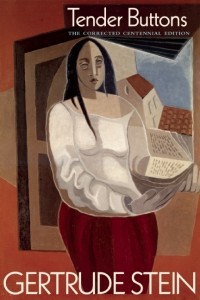 Tender Buttons: The Corrected Centennial Edition
Tender Buttons: The Corrected Centennial Edition
by Gertrude Stein
Edited by Seth Perlow
City Lights Publishers, April 2014
134 pages / $9.95 Buy from City Lights or Amazon
Gertrude Stein’s Tender Buttons came at the right time. Of course, it made no sense to me at first, as did the roller coaster of events in my life during the 3 times I read it. I went through some serious changes just trying to figure out how I felt about Stein, much less the book. One minute, I enjoyed her experimentalism, an obvious reflection of her larger-than-life persona. The next, she irritated me, like an itchy eyeball or a throat tortured by the skin of a popcorn kernel.
It took a while to break through the frustration that mirrors that one literary reading you attend where no one wants to admit they’re clueless about what the guest speaker is saying. Still, there’s a cacophony of ‘mmm’s’ at the conclusion of all his poems. Head nods from the audience give him confidence to admit he wrote the final piece on the bus ride over as he holds the paper at an angle where the room’s lighting spills over typed words. But, everyone smiles and over-compliments him at intermission over refreshments, and mocks the boorish girl who tells him that he has a chunk of salami stuck between his front teeth.
I didn’t want to be that audience, and I wanted to believe that Stein was the random chick who said the obvious, even when it was hard to digest or accept. That’s when I decided to give the text another go (this time, from a different angle) and found the absurdity of Stein’s words surprisingly satisfying as I started reading them aloud. I drew the shades one day, lit candles in my tiny apartment, and settled on the futon, paperback in one hand and a glass of wine in the other. The Stein-like shawl I’d draped over my shoulders and pinned with a broach threw me into character and suddenly, I was reading the way I’d seen several of my favorite writers read. With passion and rhythm and a glowing grace. I stopped thinking and felt everything. My tongue was on fire as the words fell out effortlessly.
June 6th, 2014 / 10:00 am
Molly Gaudry’s SUMMER READS
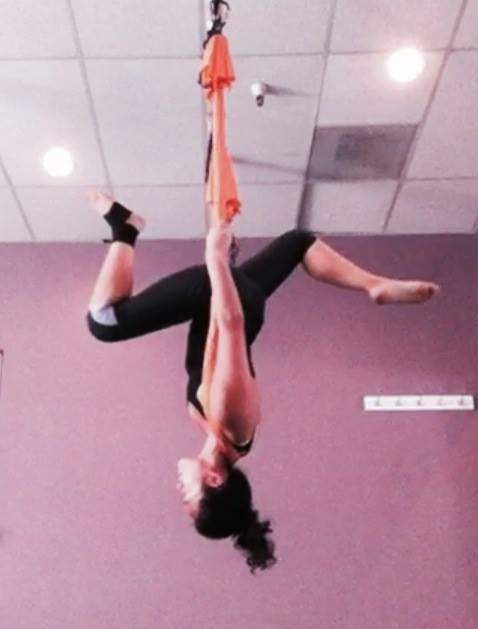
As part of Summer Reads, Molly Gaudry shares what she’s planning on reading this summer.
***
My first year as a PhD candidate at the University of Utah is behind me. Classes ended in April, and for the entire month of May I’ve mostly been hanging upside down at Imagination Place (our local AntiGravity Fitness studio here in SLC). As an instructor-in-training, working toward certification, I haven’t had or made time to read since the end of the term, and it’s been a relief to work the body for days and weeks on end instead of the mind (even if I don’t necessarily believe in such a distinction, preferring instead to think of the body as the mind in motion). But this morning, for the first time in over a month, I cracked open a book. Marguerite Duras might have said this particular book was screaming at me from its place on the shelf. Who knows why a book screams when it screams.
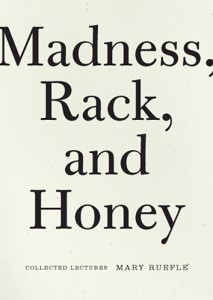
The book was Mary Ruefle’s Madness, Rack, and Honey (Wave). First I reread one dog-eared passage about Sappho, the moon, and lyric poetry. Ruefle supposes that “stars were the first text, the first instance of gabbiness; connecting the stars, making a pattern out of them, was the first story, sacred to storytellers. But the moon was the first poem, in the lyric sense, an entity complete in itself, recognizable at a glance.” I love that she thinks this, that she wrote this. I look at the moon sometimes and am filled with wonder: Who else is looking at this moon, tonight, right now, like me? Did you know that May’s full moon was a “flower moon” and that June’s will be a “strawberry moon”? Do you remember Calvino’s story about the moon: “I could distinguish the shape of her bosom, her arms, her thighs, just as I remember them now, just as now, when the Moon has become that flat, remote circle, I still look for her as soon as the first sliver appears in the sky, and the more it waxes, the more clearly I imagine I can see her, her or something of her, but only her, in a hundred, a thousand different vistas, she who makes the Moon the Moon and, whenever she is full, sets the dogs to howling all night long, and me with them.” In a “Music and Mantra” workshop I took a few weeks ago with mostly yogis, I decided I liked one yogi in particular and made a mental note—what the hell—to take her next “full moon yoga class” outside, in a park, under the night sky. I’m into the moon, I guess. And I was attracted to this woman’s gentleness, how kind she seemed, and how, surprisingly, she wasn’t all that “woo-woo” for a yogini who teaches a full-moon yoga class in a park every month. I wonder, What is your story about the moon?
In Ruefle’s title essay, a fair bit of time is spent puzzling out a three-line poem attributed to Hafiz:
I shall not finish my poem.
What I have written is so sweet
The flies are beginning to torment me.
“It is so simple and clear,” Ruefle writes, “the ‘figurative’ sweetness of the author’s verse has become honey, causing ‘literal’ flies to swarm on the page or in or around the author’s head. This is truly the Word made flesh, the fictive made real, water into wine. That is the honey of poetry: the miracle of its transformation, which is that of creation: once there was a blank page—scary!—now there is something in its place that is attracting flies. Anyone who has not experienced the joy, pleasure, transport, and sweetness of writing poems has not written poems. If it has never once been fun for you, you probably haven’t experienced what we talk about when we talk about poetry.”
June 6th, 2014 / 10:00 am
25 Points: Godzilla
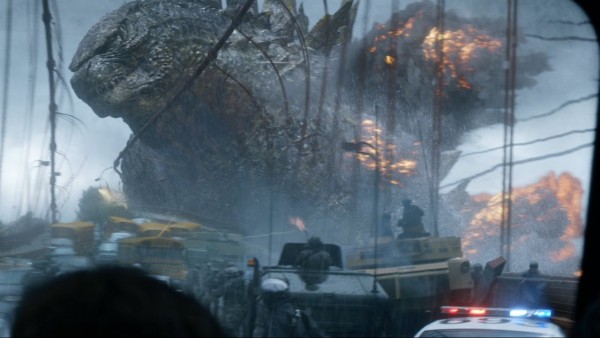
1. Spoiler Alert: Godzilla breaks shit and wins at everything.
2. Bryan Cranston is the best actor in this movie.
3. They fucking kill Bryan Cranston in the first third of the movie.
4. Confirmed societal standard: it’s still not okay to have New York City as the setting for a cataclysmic event that involves mass amounts of destruction—fictional monster battles included.
5. Aaron Taylor-Johnson’s character has a strange combination of good and bad luck due to the life-threatening situations he falls into and narrowly escapes at consecutive twenty-minute intervals.
6. Ken Watanabe is the second best actor in this movie.
7. Godzilla and I have similar lifestyles: go hard for about a week then sleep off the insanity for months or years on end. Repeat accordingly.
8. Godzilla actually looks like Godzilla in this movie. (Compared to the abomination made in 1999 that shan’t be named.)
9. This movie impressed me with its effective use of slow-pace plot format in actually waiting to show us our reptilian friend and all the loveable destruction he brings. (See Jaws for similar example.)
10. It’s actually pretty neat to have characters, besides Godzilla, that you actually give a shit about and have semi-decent back-stories. READ MORE >
June 5th, 2014 / 5:00 pm
30 Pictures of Refrigerators
Amina Cain is the author of Creature, one of my favorite books in 2013.
Andrew Weatherhead is funny. I follow his twitter and laugh often at his tweets.
POEM-A-DAY from THE ACADEMY OF AMERICAN LUNATICS (#19- featuring Nathan Curtis Warner)..
With “Leo’s Playtime Invocation” I set out to capture the mounting tension I see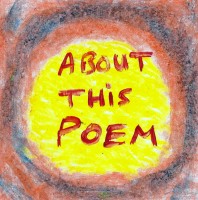 in Leo every time I squeak his ball. His movement and barks grow more urgent with every squeak and every playtime seems to set us into a trance of tease, throw, capture, and retrieve. Moondog’s composition entitled “Invocation” lends itself to creating a compound mimicry of a rising ‘Shepard’s Tone‘ with video clips whose motion and content form a sort of visual poetic line or set of refrains. My voice and poem adds my own temporary psychosis. As I talk to Leo, I notice he pays me no heed. I’m but a needle and plunger to his heroin.
in Leo every time I squeak his ball. His movement and barks grow more urgent with every squeak and every playtime seems to set us into a trance of tease, throw, capture, and retrieve. Moondog’s composition entitled “Invocation” lends itself to creating a compound mimicry of a rising ‘Shepard’s Tone‘ with video clips whose motion and content form a sort of visual poetic line or set of refrains. My voice and poem adds my own temporary psychosis. As I talk to Leo, I notice he pays me no heed. I’m but a needle and plunger to his heroin.
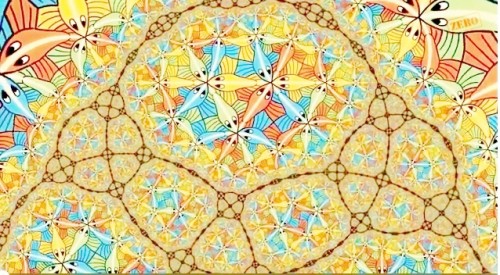
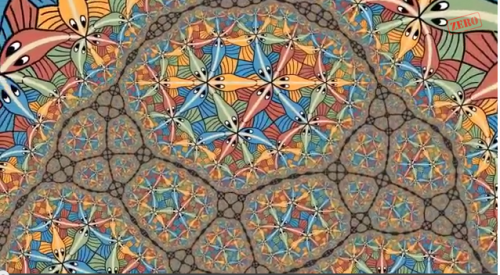

Nathan Curtis Warner is an unpublished writer curating the performance series LYE:SITUATIONS and the reading series LYE:WORDS in Portland, OR.
June 5th, 2014 / 12:00 pm
Alt WTF (The Yolo Pages)
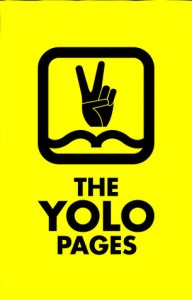 The Yolo Pages
The Yolo Pages
Boost House, April 2014
206 pages / $15.00 Buy from Boost House
“Just between the time when one could use one’s age as a power and one uses one’s age as a crutch.” – Jack Spicer (paraphrasing Arthur Rimbaud) from “Homage to Creeley/Explanatory Notes” in My Vocabulary Did This To Me
“Alt Crit” is a term I’m pretty confident I just invented… or at any rate, hope to make some money off of for my own altruistic (see also: poetic) purposes. Everybody knows Poetry with a capital “P” is a negative economy, and that anyone who has nevertheless found a way to sell his or herself as a poet must be a genius at something. Maybe not the actual writing itself, but self-promotion, for example. By editing and publishing this anthology of poems, Steve Roggenbuck, “the first poet to be cataloged as a meme” is finally profiting somewhat from his 18,000 Twitter followers and his slew of YouTube video-monologues about poetry. When I switch on a Roggenbuck video, I feel like I’m watching dust collect on an empty stage; or someone bombing an audition for the high school play over and over again. I can’t ignore it because this is my generation, but then eventually I feel the need to switch it off, so I do.
While attempting to read The Yolo Pages anyway (I did flip through a lot of it, my friend has one…), I got the feeling it could only have been written by one person, most likely our aforementioned “Alt Lit” vlogger maestro. I say this because everything in the book has the same flat, naïve air about it… half-hearted altruism, with a hyper-moralistic identity politics foregrounded at all times. This gets old fast. There is no articulate political stance here (beyond this claim that being Vegan and straight-edge is going to somehow save the world) and no formal invention on the page whatsoever. These are mostly un-ironic lyrical poems with titles like “Accept Me.” There are some cute typos intentionally thrown in every once in a while too, as ornament.
Contributors like Andrew W.K. are in the book clearly for their fame-generating potential. K. Silem Mohammed is in it because he’s a venerable older poet and seems like a nice, charitable person. Ditto Sharon Mesmer. I happen to like Patricia Lockwood’s poetry as well, but she’s poorly represented by this selection of her Tweets… why not print excerpts from that poem of hers that went über-viral last year? Has that poem ever even appeared in print before? As his influences, Roggenbuck has cited e.e. cummings, Flarf, Walt Whitman, Jenny Holzer, Roland Barthes, Miranda July, Dada, William Blake, Surrealism, The Beat Generation, The Lost Generation, Generation X, Generation Y, The X-Files and Punk. Whatever it is, his youth is supposed to make it fashionable again. But when someone is being compared to, and/or makes a habit of comparing themselves to pretty much everything that has happened before in their medium, it becomes impossible to take an objective look and make any decision as to whether you even like it or not. You have to like it, or else you run the risk of being called out as a h8r.
Like Nardwuar, Roggenbuck is basically a hype man…another fan boy for contemporary poetry, the perfect gadabout and Web 2.0 chameleon. The videos are amazingly solipsistic for a guy who claims to be starting a morally righteous collective (privately funded by Kickstarter, of course). The bookstore of the future is opening its doors, and he’s determined to make a job for himself there. Like Pharrel, he’s probably much better off producing other people’s work than making any of his own, and he’s all about being avant-happy. I would like his videos more if he interviewed people like Nardwuar does. He could interview poets, or strangers on farms in rural Michigan, and ask them what they think about poetry. That might be a little more compelling. The strangest thing about the videos is the chintzy music in the background, which makes the work eerily reminiscent of the corporate advertisements for those expensive iDevices that allow it to happen and be distributed so widely.
If this is supposed to be an alternative, why even do a print book in the first place? On the inside cover, there’s just a bunch of social media addresses for where to send a letter, if you care to know where Boost House printed this book. There is also a very peculiar ellipsis in the middle of that James Baldwin epigram at the front, which makes me wonder if the quote is correct. They don’t even note where it comes from, because of course it comes from the Internet. Roggenbuck is a clever opportunist who knows there is a vacuum outside the walls of the MFA debt factory that needs to be filled with something… but you can’t fight vacuity with even more vacuity and paper wasting. Where are the ecologically minded poets of yesteryear? Are they seeing this? It’s enough to make a young poet run scared back to the classroom to grip that MFA degree pronto. Some maniacal workshop teacher right now is probably screening Roggenbuck videos for their students as an object lesson: “Thinking of dropping out? Well, you might end up like this…” So in that way, he has (ironically) already allowed himself to be assimilated as a booster for the very system he would have us believe he is railing against.
The Yolo Pages is not Alt Lit, meta-modernism, emo, homespun, “new sincerity” or “uncreative writing.” It’s all much too aspirational to be any of those; it’s more like some new kind of ineffective self-help poetry. So actually, it’s a lot like America’s once-favorite poncho-wearing poet and translator Robert Bly, with his whole Iron John thing, where men went out together shirtless to the woods so they could help each other bang on drums and recuperate their masculinity. Wasn’t that embarrassing enough? “Young Adult” poetry might be a better, more lucrative fit than Alt Lit. Maybe The Yolo Pages makes people who suffer from extreme logorrhea (online) feel better together. It’s all like this endless rabbit hole you’re being led down, and there’s nothing at the end but a sign that says “thanks for following.”
***
Ben Tripp is on Facebook.
June 5th, 2014 / 10:00 am
Contributor Things

Our people do other things (or “thangs,” which is the way I recommend saying that word), and here are some of them. Feel free to support Htmlgiant in new, exciting ways by engaging our contributors outside of this domain. All of their shit is hot, and you should love them as I do.


